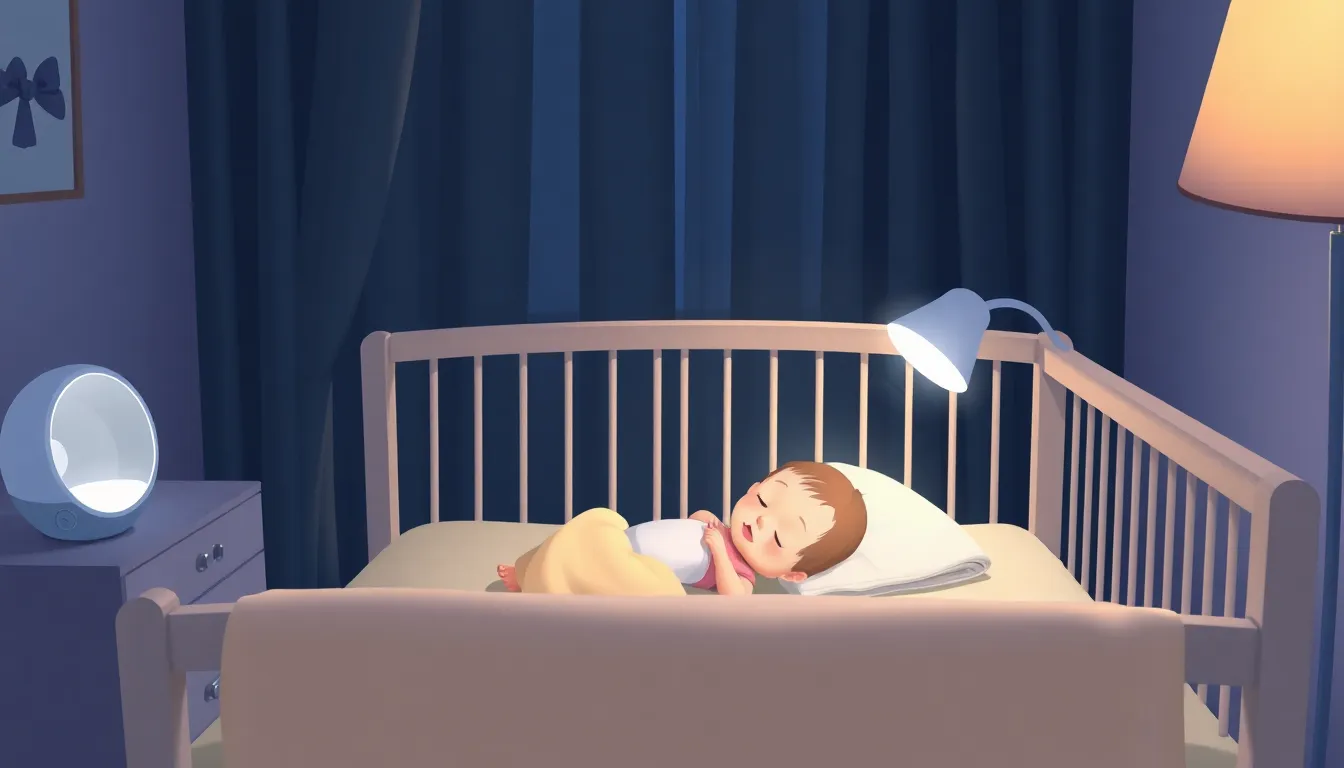Table of Contents
TogglePicture this: a well-rested parent, coffee in hand, quietly celebrating the miracle of a two-month-old sleeping for a solid eight hours. Sounds like a dream, right? For many new parents, the thought of their tiny bundle of joy snoozing through the night feels like winning the lottery—without the need for a ticket!
Understanding Infant Sleep Patterns
Infants have unique sleep patterns that differ from adults, often leading to surprises for new parents. Understanding these patterns helps in establishing healthy sleep routines.
Normal Sleep Duration for Infants
At two months old, infants typically require 14 to 17 hours of sleep each day. This total may come from naps and longer nighttime sleep periods. During this stage, some babies may sleep up to eight hours at night, which signals their developing sleep endurance. Parents should note that individual sleep needs vary, with some babies sleeping more or less. Tracking sleep schedules can help identify patterns and ensure infants get sufficient rest.
Sleep Cycles at 2 Months
Sleep cycles for two-month-olds last about 50 to 60 minutes. Each cycle involves different sleep stages, including light sleep, deep sleep, and REM sleep. Babies experience more active REM sleep compared to adults, which plays a crucial role in brain development. Many infants transition between these stages frequently, leading to shorter sleep bouts. Recognizing these cycles enables parents to respond appropriately during night awakenings, potentially easing the sleep process for both parent and child.
Factors Influencing Sleep

Multiple factors influence a two-month-old’s ability to sleep for extended periods, including feeding routines and environmental conditions.
Feeding and Sleep
Feeding patterns significantly affect sleep duration. Babies who receive adequate nutrition tend to sleep more soundly. Breastfeeding or formula feeding close to bedtime contributes to longer sleep stretches. With a fuller stomach, infants may comfortably sleep for hours without waking. Parents should ensure feeding occurs in a calm environment to promote relaxation. Each baby’s needs differ, and some may require more frequent feedings, affecting overall sleep patterns. Observing cues of hunger can help establish a consistent feeding schedule, fostering better sleep in the long run.
Environmental Considerations
Environmental factors play a crucial role in an infant’s sleep quality. A quiet, dark room encourages deeper sleep. Maintaining a consistent temperature—around 68 to 72 degrees Fahrenheit—helps keep babies comfortable. Using white noise machines or soft lullabies can also provide soothing background sound, masking potential disturbances. Changes in light exposure throughout the day support the baby’s natural circadian rhythms. Influential elements like bedding and sleepwear should be safe and breathable to ensure comfort while sleeping. These considerations create an optimal sleepy environment for infants, enhancing their overall rest.
Tips for Encouraging Sleep
Encouraging a two-month-old to sleep well involves specific strategies. Parents can implement effective routines and environmental adjustments.
Establishing a Bedtime Routine
Establishing a consistent bedtime routine promotes relaxation. A soothing sequence, such as bathing, reading, or singing a lullaby, signals to the baby that it’s time for sleep. Implementing the same activities nightly helps create familiarity. Gradual transitions from playtime to quiet time ease the baby into sleep. A calm atmosphere during these routines reassures the infant, leading to longer sleep stretches. Aim for a start time each night to cultivate a healthy sleep cycle.
Creating a Comfortable Sleep Environment
Creating a comfortable sleep environment supports better sleep. Keep the room dark, quiet, and at a consistent temperature around 68 to 72°F. Soft, breathable bedding and sleepwear enhance comfort and safety. Utilizing white noise machines can help mask disruptive sounds. Parents should also ensure that the crib or bassinet is free from clutter and unnecessary items. Light exposure during the day helps set the baby’s internal clock, reinforcing nighttime sleep patterns.
What to Expect
Understanding what to expect from a two-month-old’s sleep can help new parents navigate this stage of infancy with confidence.
Milestones in Sleep Development
At two months old, significant milestones in sleep become apparent. Babies typically experience longer stretches of sleep that may reach up to eight hours at night. Growth spurts and developmental leaps often coincide with changes in sleep patterns. Most infants begin to establish a more predictable sleep schedule. By two months, their sleep cycle begins to mature, with periods of light and deep sleep progressively increasing. This development supports healthy brain growth. Parents may notice that naps become more structured, averaging around three to four naps per day.
Signs of Sleep Problems
Identifying signs of sleep problems early can be crucial for a baby’s well-being. Frequent nighttime awakenings could signal hunger or discomfort. Difficulty falling asleep might indicate an overstimulated environment. If parents observe excessive fussiness despite a consistent routine, it may be time to reassess feeding schedules or bedtime practices. Additionally, if a baby seems excessively sleepy during the day, it could point to irregular sleep patterns. Parents should consult professionals when sleep issues arise. Recognizing these signs fosters a proactive approach to addressing potential sleep challenges.
A two-month-old sleeping for eight hours is a remarkable milestone for both baby and parents. This achievement not only brings relief but also signifies the baby’s growing sleep endurance. By understanding sleep patterns and creating a nurturing environment, parents can foster better sleep habits.
Implementing consistent bedtime routines and ensuring a comfortable sleep setting can make a significant difference. As babies continue to develop, their sleep needs may change, so staying attentive to their cues is essential. Recognizing signs of sleep challenges early can help maintain a healthy sleep routine. Ultimately, every peaceful night of sleep contributes to the baby’s overall well-being and development.







